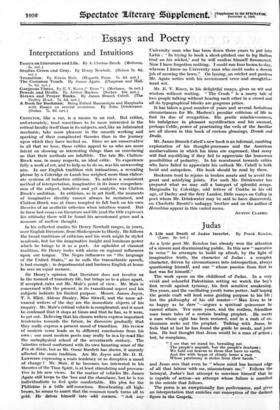Essays and Poetry
Interpretations and Intuitions
Bodley Head. 7s. 6d. net.)
A Book for Bookmen. Being Edited Manuscripts and Marginalia with Essays on several occasions. By John Drinkwater. (Dulau. 7s. 6d. net.).
CRITICISM, like a car, is a means to an end. But critics, unfortunately, tend sometimes to be more interested in the critical faculty itself than in its subjects, and,like an infatuated mechanic, take more pleasure in the smooth working and sparking of their complicated theories than in the journey upon which they have invited us. Since we are conservative in all that we love, those critics appeal to us who are more intent on showing us interesting things than on convincing us that their methods are infallible. The late Mr. Clutton- Brock was, in many respects, an ideal critic. To experience fully a work of art, and to help us to do so, was his unwavering aim. In our English tradition rich intimations, a revealing phrase by a Coleridge or Lamb has weighed more than elabor- ate systems of inductive criticism. To achieve a consistent method of interpretation, imaginative in its inner comprehen- sion of the subject, intuitive and yet analytic, was Clutton Brock's ambition. In criticism, as in art itself, the moments of imaginative identity cannot always be sustained, and Clutton-Brock was at times tempted to fall back on his own theories of an aesthetic criterion when intuition waned. But- in these last essays on literature and life (and the title expresses his attitude) there will be found his accustomed grace and a measure of mellow thought.
In his collected studies Sir Henry Newbolt ranges, in years, over English literature, from Shakespeare to Hardy. He follows the broad traditions of criticism and his work might be styled academic, but for the imaginative insight and luminous power which he brings to it as a poet. An upholder of classical tradition, Sir Henry looks with alarm on regional influences upon our tongue. The Negro influences on "the language of the United States," as he calls the transatlantic speech, is bad enough ; in departmental and business English at home he sees an equal menace.
Sir Henry's opinion that literature does not involve us in the turmoil of transitory life, but brings us to a place apart, if accepted, rules out Mr. Muir's point of view. Mr. Muir is concerned with the present, in its transitional aspect and his subjects indicate his limited purpose. Messrs. James Joyce, T. S. Eliot, Aldous Huxley, Miss Sitwell, and the more ad- vanced writers of the day are the immediate objects of his enquiry. Mr. Muir's critical vehicle is complicated, and it must be confessed that it stops at times and that he has, as it were, to get out. Believing that his chosen writers express important tendencies towards the future, he discovers gradually that they really express a present mood of transition. His review of modern verse leads us to different conclusions from his own ; our most modern poets may really be in a by-road like the metaphysical school of the seventeenth century. The
'nineties school conformed with its own haunting sense of the Pin de Steele, but as Mr. Oscar Burdett has shown, it scarcely
affected the main tradition. Are Mr. Joyce and Mr. D. H.
Lawrence expressing a main tendency or as deceptive a mood of change ? Mr. Muir, if he becomes too interested in his
theories of the Time Spirit, is at least stimulating and provoca- tive in his new views. In the matter of vehicles Mr. James Agate still keeps to the 'bus and the charabanc, but he is too
individualistic to feel quite comfortable. His plea for the Philistine is a trifle self-conscious. Browbeating all high: brows, he seems to assert that the common touch turns alt to gold. He drives himself into odd corners. " Ask any University man who has been down three years to put into Latin : In trying to hook a short-pitched one to leg Balbus trod on his wicket,' and he will confess himself flummoxed. Now I have forgotten nothing.- I could run four looms to-day, whereas I know no University man who could make a decent job of mowing the lawn." On booing, on cricket and gardens Mr. Agate writes with his accustomed verve-and-straightfor- ward wit.
Mr. E. V. Knox, in his delightful e,ssay_s, gives us wit and wisdom without waiting. " The Crush " is a merry tale of two people talking without hearing each other in a crowd and all its typographical blanks are gorgeous prizes. -
It has taken a good number of years and several fortuitous circumstances for Mr. Machen's peculiar criticism of life to find its due of recognition. His gentle mischievousness, his indulgence in pleasant mystification and his unusual, perhaps Celtic, power of penetrating the veils of the familiar are all shown in this book of curious gleanings, Dreads and Drolls.
Mr. James Branch Cabell's new book is an informal, rambling explanation of his thought-processes and the American mediaevalisms in which his ideas are expressed, that many will find mystifying if they fail to appreciate the humorous possibilities of pedantry. In his resentment towards critics who have failed to appreciate his outlook Mr. Cabell is both lucid and outspoken. His book should be read by them.
Bookmen tend to rejoice in broken meats and to avoid the great and satisfying joints. For such Mr. Drinkwater has prepared what we may call a banquet of splendid scraps. Marginalia by Coleridge, odd- letters of Crabbe in his old age, of Darley and the fiery Landor, little essays on Collop (a poet whom Mr. Drinkwater may be said to have discovered), on Charlotte Bronte's unhappy-brother and on the author of Heraclitus appear in this varied menu. - AUSTIN CLARKE.






























































 Previous page
Previous page